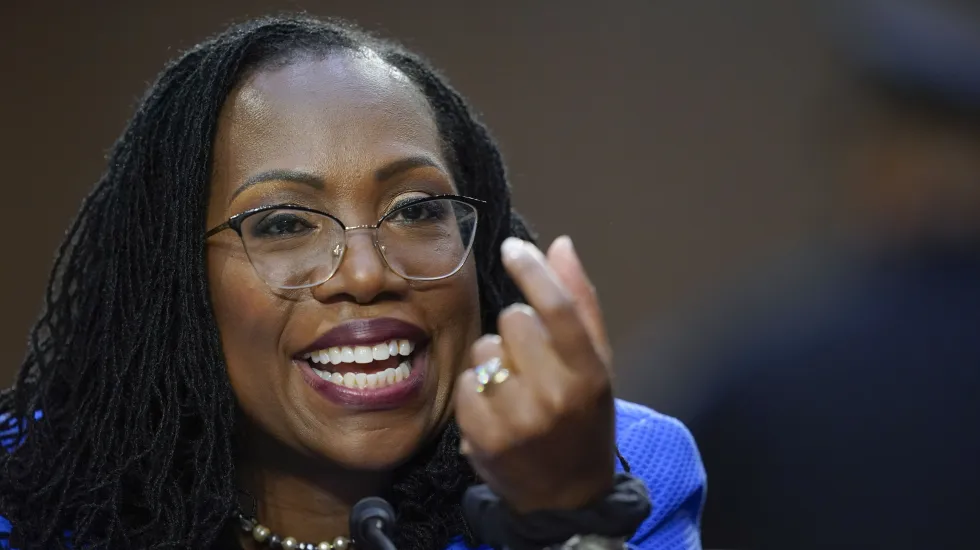
Ketanji Brown Jackson should not have had to field a slew of asinine and offensive questions when she testified before the U.S. Senate Judiciary Committee last week.
Anyone aspiring to a lifetime appointment on the nation’s highest court should expect tough, probing questions.
But during the four-day hearings on Jackson’s nomination, there were far too many inquiries on matters that had nothing to do with her career and qualifications. In our view, those questions were a shameful example of the workplace discrimination experienced by African Americans and other people of color aspiring to high-profile jobs.
Extra scrutiny and not-so-thinly-veiled dog whistles? They are commonplace when a Black candidate, no matter how competent or exceptional, is being considered for a job at the top of the ladder.
Editorial
In this instance, it won’t matter. Jackson deserves a seat at the table — in this case, a seat on the highest court in the nation.
“You have earned this spot. You are worthy. You are a great American,” Sen. Cory Booker, D-N.J., told Jackson, who made history in February when President Joe Biden nominated her to be the first Black woman on the Supreme Court.
The Senate Judiciary Committee is aiming to vote on Jackson’s nomination on April 4, Chicago Sun-Times Washington Bureau Chief and columnist Lynn Sweet reported. If all the Democrats stick together, Jackson will be confirmed a few days later — even if all 50 Republicans vote against her.
It will be interesting to see if any Republicans break ranks, something Biden and Judiciary Committee Chair Dick Durbin, D-Ill., have been pushing for. Three Republicans —Sen. Susan Collins, R-Maine; Sen. Lisa Murkowski, R-Alaska; and Sen. Lindsey Graham, R-S.C.— voted to put Jackson on the federal appeals court last year.
Making history in multiple ways
Of the 115 Supreme Court justices appointed since the Court was established in 1789, 108 have been white men.
Jackson, currently a federal appeals court judge, would be the third Black justice, after Thurgood Marshall and Clarence Thomas, and the sixth woman, to serve. She would replace retiring Justice Stephen Breyer, whom she thanked for giving her “the greatest job that any young lawyer could ever hope to have” during her days as his clerk.
Jackson’s presence won’t change the 6-3 supermajority that conservatives now hold on the Court. But it will be historic nevertheless, making the Court more reflective of America’s diversity. In addition, Jackson, a former member of the U.S. Sentencing Commission, would be the first former federal public defender on the Court. Sonia Sotomayor is the only sitting justice with experience as a trial judge, but Jackson would be the first justice since Marshall who has represented marginalized communities.
That background led to some Republicans needling Jackson for being too soft on crime. We wonder if they just forgot that Jackson won the backing of law enforcement, including the head of the national Fraternal Order of Police, the International Association of Chiefs of Police and the National Organization of Black Law Enforcement Executives.
Some GOP senators also chastised Jackson for what they claimed were too lenient sentences she gave to child sex offenders and for representing Guantanamo Bay detainees. Politifact rated the first critique as “mostly false.” As for the second, that’s a major reason why our Constitution is worth defending: It gives everyone accused of a crime the right to due process and legal representation.
Sen. Ted Cruz, R-Texas, gave his assurance that the hearings would not be a “political circus.” But Cruz and others on the right, including Missouri Sen. Josh Hawley and Arkansas Sen. Tom Cotton, forged ahead and turned a good portion of the proceedings into a Ringling Bros. and Barnum & Bailey spectacle.
The dog whistles were rolled out with precision.
Opinion This Week
A weekly overview of opinions, analysis and commentary on issues affecting Chicago, Illinois and our nation by outside contributors, Sun-Times readers and the CST Editorial Board.
Cruz pressed his former Harvard Law School classmate on critical race theory, asking her if babies were racist as he sat next to illustrations from author Ibram X. Kendi’s book “Antiracist Baby.”
“I do not believe any child should be made to feel as though they are racist,” Jackson said with a sigh.
Sen. Marsha Blackburn, R-Tenn, urged Jackson to “provide a definition for the word ‘woman’” as she fished for the judge’s views on gender identity.
“I’m not a biologist,” Jackson replied.
At one point, Graham grilled Jackson about her faith and asked if she “could “fairly judge a Catholic.”
“I am reluctant to talk about my faith in this way,” Jackson, a non-denominational Protestant, responded. “As you know, there is no religious test in the Constitution.”
Durbin may have put it best when he said, “For some who are opposing her, it’s a bitter pill to accept this kind of change in America.”
Jackson said she would “stay in her lane” and rule on cases “without any agendas.” Americans, who according to public opinion polls have an increasingly negative view of the Court as too political, expect that.
The next and last stop for Ketanji Brown Jackson is the Supreme Court.
Send letters to letters@suntimes.com.







